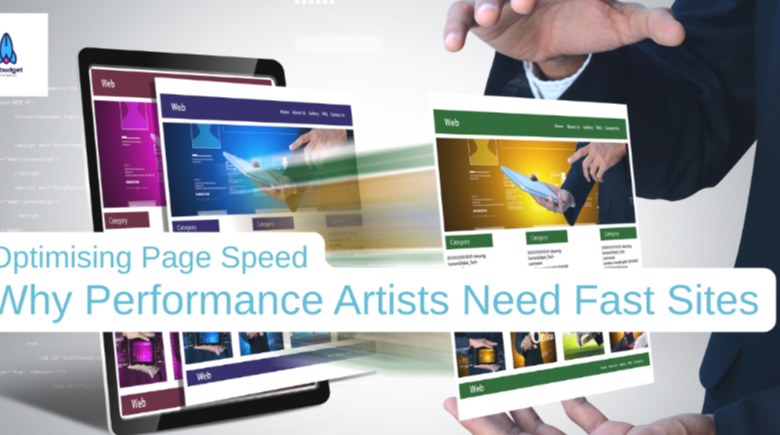Optimising Page Speed: Why Performance Artists Need Fast Sites

Performance artists need fast websites because venue bookers browse multiple performers quickly and won’t wait for slow portfolios to load. A laggy site means losing gigs to competitors with snappier online presence. But that’s not the only reason speed is important for your performance career.
Today we’ll let you know:
- What page speed means for your artist website
- How search engines use performance for rankings
- The cost of slow web pages on bookings
- Website optimisation techniques that work
- Why speed is an ongoing process
If you’re losing potential bookings to performers with better sites, then stay with us at No Budget Performance. We’ll show you everything from understanding speed metrics to implementing practical fixes. Let’s start with what page speed means first.
What Page Speed Means for Your Artist Website
Most performers think page speed is just a technical term developers throw around. Actually, it’s the single number that determines whether a festival coordinator sees your fire dancing video or clicks away to book someone else instead.

So what does this look like in practice?
- Load time measurement: Page speed measures how quickly your site content loads when someone clicks on your link or types your URL. It’s the difference between a booker seeing your work in two seconds versus waiting eight seconds while staring at a blank screen.
- Keeping bookers engaged: Faster loading times keep potential bookers engaged, while slow sites make them leave before seeing your work or contact details. When a venue manager clicks through to three performer sites and yours takes six seconds while the others load in two, you’ve already lost the booking before they’ve seen a single photo of your act.
- Testing your speed: Speed gets measured in seconds using tools like Google PageSpeed Insights, which score your website from zero to one hundred. A score above 90 is excellent, 50-89 needs improvement, and anything below 50 means you’re definitely losing potential clients to faster competitors.
The numbers are one thing. What really stings is how Google uses those same speed scores to decide which performers show up on page one versus page three when bookers search online.
How Search Engines Rank Fast vs Slow Websites
Did you know that Google includes page speed as a confirmed ranking factor, affecting whether your site appears on page one or gets buried where no one will find it?

Yes, that’s true. Google prioritises fast websites in search results because it wants users to have good experiences when clicking through from searches. The reason is pretty straightforward.
When someone in Brisbane searches “performance artist hire” and lands on a slow website, they bounce back to Google, and it’ nothing but frustrating. That tells Google the site doesn’t deliver what searchers need.
Slow-loading sites drop lower in rankings, which means fewer people searching for performers will find your website (and yes, Google tests your site on actual 3G connections, not fancy office wifi).
When you rank on page two instead of page one purely because of speed issues, you’re missing out on hundreds of potential booking enquiries every month. Most people never scroll past the first five results.
Mobile speed is even more important since Google uses mobile performance as the primary ranking factor through their Core Web Vitals metrics for all search results now. This mobile-first focus means your slow page speed directly impacts how many bookings you lose to faster competitors.
The Real Cost of Slow Web Pages
Now that you understand how search engines view speed, let’s talk about what slow loading costs you in bookings and lost opportunities.
Let’s be honest here, three seconds doesn’t sound like much until you realise that’s all the time you get before losing half your potential clients.
Lost Bookings Within Seconds
Research from Google shows that more than 50% of mobile users abandon websites that take longer than three seconds to load. Event organisers browsing multiple performer sites won’t wait around when your competitor’s portfolio loads instantly. We’ve rebuilt sites for Brisbane performers who lost entire seasons because bookers couldn’t get through their portfolios. Every extra second of load time can reduce conversions by seven percent.
Mobile Users Abandoning Your Site
Most venue managers search for performers on their phones here and there during breaks at work. Slow mobile sites eat through their data plans and patience. When your site takes eight seconds to load on their phone, they’ve moved on before your hero image even appears. Yes, it’s that simple. Fast mobile sites get bookings.
Your Reputation is Taking a Hit
A slow website makes you look unprofessional even when your performance work is top quality. Word spreads fast in Brisbane’s performance scene. When a festival coordinator struggles with your laggy portfolio site, they’ll mention it to other organisers, and suddenly you’re not getting callbacks for gigs you never even knew about.
The good news? You don’t need to be a tech wizard to fix these issues. Some straightforward optimisation techniques can turn your slow site into a booking machine.
Website Optimisation Techniques That Work
The best part about website optimisation is that you don’t need expensive developers or technical skills to make meaningful improvements that boost your loading speeds.
And that’s where things get interesting…
| Optimisation Technique | Impact on Speed | Implementation Difficulty |
| Image Compression | 60-80% faster loading | Easy (free tools available) |
| Quality Web Hosting | Consistent fast performance | Moderate (monthly investment) |
| Remove Unused Plugins | 30-50% improvement | Easy (regular maintenance) |
The table above shows three optimisation techniques that work. Let’s break down how to use each one.
Compressing images is the quickest win you’ll get because most artist portfolios have massive photo files that take forever to load. Run your images through free tools like TinyPNG before uploading them to your site. You’ll reduce file sizes by sixty to eighty percent without anyone noticing the quality difference.
Choosing quality web hosting over cheap shared servers gives your site dedicated resources, so pages load consistently fast. Yes, paying an extra twenty dollars monthly for proper hosting instead of the cheapest option hits the nail on the head when it comes to preventing those frustrating moments where your portfolio won’t load during peak browsing hours (we’ve watched talented performers miss festival bookings because of this exact issue).
Removing unnecessary plugins and scripts strips away code bloat that slows down every page on your artist website. When we audit artist portfolios, we typically find eight to twelve plugins that aren’t being used anymore but are still running in the background and adding three to five seconds to every page load. Taking action on these three areas will improve your site speed dramatically.
Why Speed Is an Ongoing Process
Here’s something most artists don’t realise: fixing your speed once doesn’t mean it stays fixed forever. Websites slow down naturally over time.
Most artists think they’re done after the first fix. They’re not.
Websites accumulate digital clutter over time through old images, outdated plugins, and cached files that gradually slow performance down. Think of it like your phone getting slower as you install more apps and take more photos. The same thing happens to your site.
There is a simple solution. Running regular speed tests every few months helps you catch problems early before they seriously impact your search rankings. A quick test through PageSpeed Insights takes five minutes but can prevent you from dropping off page one in search results, where ninety percent of all clicks happen. Yes, it’s worth the minimal effort.
The bigger picture here is that web technology keeps changing. What worked brilliantly last year might need updates to maintain the same performance today. Google updates its algorithms, and mobile devices get faster, which pushes the baseline for acceptable speed higher each year.
You’ll find yourself back to square one if you’re not staying current with optimisation practices. Monitor your site quarterly and you’ll stay ahead of performance issues. That’s our genuine suggestion based on rebuilding dozens of performer websites across Brisbane.
Making Speed Work for Your Performance Career
We’ve covered a lot about page speed today, from what it means to how it affects your bookings. The bottom line is simple. Fast websites give you a genuine advantage because bookers can see your work before losing patience.
Speed improvements compound over time as better search rankings bring more visitors who convert into paying customers. When your site loads in under two seconds, those visitors stick around long enough to fill out your booking form instead of clicking back to find someone else.
Our suggestion? Start with image compression and quality hosting. While optimising speed might not be everyone’s cup of tea, it’s an effort that keeps working around the clock. We believe you’ll see more consistent bookings once you take action on your site speed.



